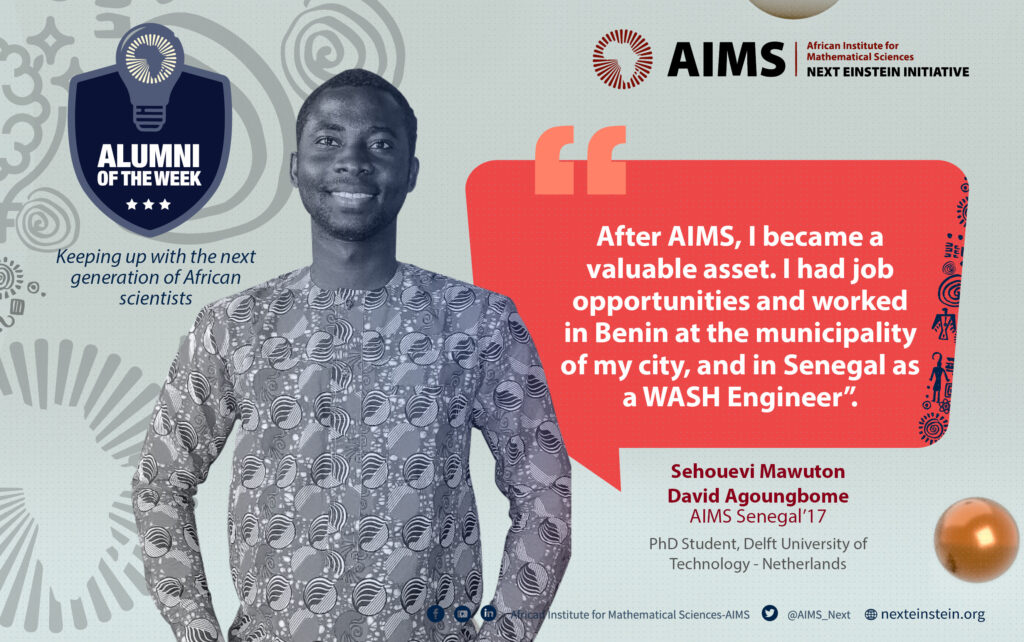Our #AlumoftheWeek emerged as runner-up in a poster presentation at this year’s American Meteorological Society annual meeting #AMS101. Sehouevi Mawuton David Agoungbome is an AIMS Senegal ‘17 alumnus and a current PhD student at the Delft University of Technology in the Netherlands.
Q: Tell us about yourself
David: I did a Master of Engineering in Civil Engineering in Benin with a major in water and sanitation. For my research activities, I had the opportunity to explore new options for surface water treatment named (electrocoagulation) using aluminium electrodes. With my certificate in my pocket, I worked a few more months in my department’s water lab before getting my first work experience. After one or two weeks of training, I became the engineer in charge of the wastewater effluent treatment plant of a brewery. It was unique and challenging to jump from school and the theories to the real world with unexpected challenges and stress. I was working there when I received the offer from AIMS to start an MSc program, which I ended up accepting.
Q: Tell us about your time at AIMS
David: I first heard about AIMS from friends who shared the exciting moments they spent at the centres, as well as the unique environment. I hesitated a bit at the beginning but wanted to explore more. After four months at my workplace, it became a routine, and I needed some new challenges. Doing maths that I love since my late father and teacher introduced me to it was just the perfect step to go.
At AIMS, the curriculum and the teaching/learning approaches were different from Benin. It was new to us and students-centred. It took me three months to adapt and adjust myself. The program was very intensive, and the first weeks were tough. I even thought of abandoning, but I continued, and with time, I felt like a crocodile in my river with a little more courage and determination. With my classmates, we became one family and supported each other. I experienced at AIMS what it meant by Pan-Africanism where there were no more boundaries and country tags but young Africans with the desire to solve Africa’s problems with maths. I can remember the morning quizzes, which forced everybody to keep pace. We were introduced to the most powerful tools of the century: “Data science and applications in all sectors”, and we had workshops with experts coming from worldwide companies and institutions from the USA, France, UK, Germany, and Africa. We had amazing professors, and the staff also worked hard to make our stay the most enjoyable.
I graduated with Distinction with my research in statistical hydrology, which focused on assessing two regional methods used to estimate the flow in structural design in West Africa.
Q: Tell us about the impact AIMS has had on you
David: By nature, I was a reserved person who only enjoyed the safe environment of my family and close friends. At AIMS, I learned how to go beyond that shyness, take the conversation initiative, and network. AIMS has also imparted in us the confidence and boldness that with determination, discipline, and clear vision, we can create an impact around us and, more importantly, our continent. We learned and discovered that mathematics is at the core of everything. Through Data science, I learned how to explore new fields in water engineering, climate change and impacts, skills and tips to be as competitive as any researcher anywhere in the world. After AIMS, I became a valuable asset. I had job opportunities and worked in Benin at the municipality of my city and in Senegal as a WASH Engineer. In 2019, I started with my PhD in Climate Change, Rainfall, and Agriculture at TU Delft, The Netherlands.
Q: Which of the SDGs is most important/relevant to you? How do you plan on addressing it in your work?
David: My passion is water, and I am always keen to work on any related topics around water engineering. My interest spans around SDG 6, safe Water and Sanitation facilities for the most vulnerable; SDG13 Climate Action to cope with global warming, and currently on SDG2 Zero Hunger. With mathematical skills, we are exploring the effects of climate change on the weather and, more specifically, the rainy season in West Africa to help farmers overcome water stress and improve water productivity and crop yield.
Q: How is your current work contributing to the development of the continent?
David: My current research focuses on Africa’s semi-arid zone with a direct link to agriculture and improving food security, and reducing poverty by developing adaptation measures to the current changing climate conditions based on accurate climate information. The outcomes of this work will impact millions of farmers in the end. Through the climate services, this work will also help farmers make informed decisions regarding their farming system and secure access to financial institutions for loans with less risk.
Q: What’s your message to current AIMS students and young people across the continent?
David: Enjoy every single minute of your stay at AIMS because AIMS is unique. Do not hesitate to explore new horizons, open your mind to all the opportunities and create them if you don’t see them. Be proud of who you are and be aware that our continent is awaiting the contribution of each one of us.
David’s winning presentation is titled “Changes in the Rainfall Pattern in the Semi-Arid Zone of West Africa: a focus on dry spells occurrence during the Growing Season.”

